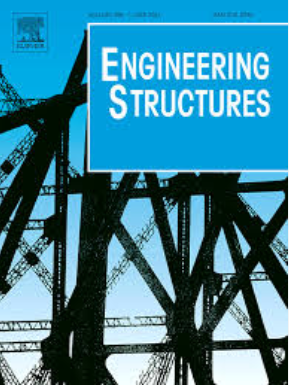Effect of size on eccentric compression performance of steel tube and sandwiched concrete jacketed CFST columns
IF 5.6
1区 工程技术
Q1 ENGINEERING, CIVIL
引用次数: 0
Abstract
This study investigated the size effect of steel tube and sandwiched concrete jacketed CFST columns under eccentric compression. A series of eccentric compression tests were conducted on 3 geometrically similar un-strengthened CFST columns and 13 strengthened CFST columns with varying structural sizes (with a ratio of 1:1.5:2), different eccentricities, and different outer steel ratios. The eccentric performance of the specimens, including their failure behaviours, load-axial displacement curves, and longitudinal and circumferential strain distribution were explored. Additionally, the size effect on nominal stress-longitudinal displacement relationships, nominal axial strength, nominal ultimate deflection and ductility index were investigated. The test results confirmed the presence of a size effect in both un-strengthened and strengthened CFST columns, with nominal strengths closely following Bažant's proposed "size effect law (SEL)". Finally, considering the influence of size effect, this study proposed axial force-bending moment (N-M) correlation curves for predicting the bearing capacity of strengthened CFST stub columns based on EC4, AISC-360, AIJ and GB 50936. Among these codes, AIJ provided the most accurate predictions when compared to the test results. Introducing the size effect coefficients mitigated the tendency to overestimate the load-bearing capacity of large-size retrofitted columns.
尺寸对钢管和夹层混凝土护套 CFST 柱偏心压缩性能的影响
本研究调查了偏心压缩下钢管和夹层混凝土护套 CFST 柱的尺寸效应。对 3 个几何形状相似的未加固 CFST 柱和 13 个加固 CFST 柱进行了一系列偏心压缩试验,这些柱子的结构尺寸(比例为 1:1.5:2)、偏心率和外层钢筋比例各不相同。研究探讨了试件的偏心性能,包括其破坏行为、荷载-轴向位移曲线以及纵向和圆周应变分布。此外,还研究了尺寸对标称应力-纵向位移关系、标称轴向强度、标称极限挠度和延性指数的影响。试验结果证实,未加固和加固 CFST 柱都存在尺寸效应,其名义强度与 Bažant 提出的 "尺寸效应定律(SEL)"密切相关。最后,考虑到尺寸效应的影响,本研究基于 EC4、AISC-360、AIJ 和 GB 50936,提出了轴力-弯矩(N-M)相关曲线,用于预测加固 CFST 柱的承载能力。在这些规范中,与试验结果相比,AIJ 的预测最为准确。引入尺寸效应系数可减轻高估大尺寸加固柱承载能力的趋势。
本文章由计算机程序翻译,如有差异,请以英文原文为准。
求助全文
约1分钟内获得全文
求助全文
来源期刊

Engineering Structures
工程技术-工程:土木
CiteScore
10.20
自引率
14.50%
发文量
1385
审稿时长
67 days
期刊介绍:
Engineering Structures provides a forum for a broad blend of scientific and technical papers to reflect the evolving needs of the structural engineering and structural mechanics communities. Particularly welcome are contributions dealing with applications of structural engineering and mechanics principles in all areas of technology. The journal aspires to a broad and integrated coverage of the effects of dynamic loadings and of the modelling techniques whereby the structural response to these loadings may be computed.
The scope of Engineering Structures encompasses, but is not restricted to, the following areas: infrastructure engineering; earthquake engineering; structure-fluid-soil interaction; wind engineering; fire engineering; blast engineering; structural reliability/stability; life assessment/integrity; structural health monitoring; multi-hazard engineering; structural dynamics; optimization; expert systems; experimental modelling; performance-based design; multiscale analysis; value engineering.
Topics of interest include: tall buildings; innovative structures; environmentally responsive structures; bridges; stadiums; commercial and public buildings; transmission towers; television and telecommunication masts; foldable structures; cooling towers; plates and shells; suspension structures; protective structures; smart structures; nuclear reactors; dams; pressure vessels; pipelines; tunnels.
Engineering Structures also publishes review articles, short communications and discussions, book reviews, and a diary on international events related to any aspect of structural engineering.
 求助内容:
求助内容: 应助结果提醒方式:
应助结果提醒方式:


